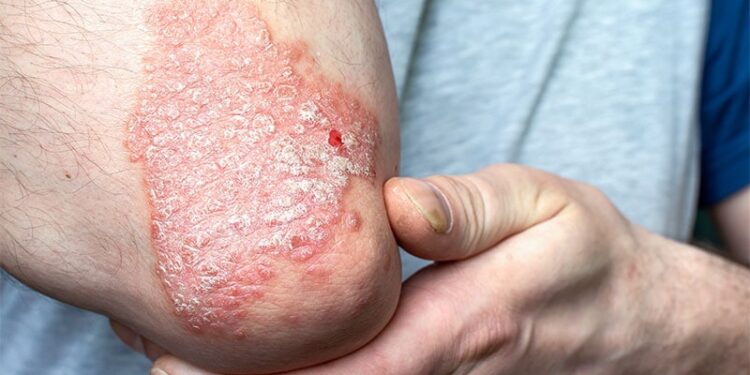TOPLINE:
Risankizumab was well tolerated and demonstrated sustained effectiveness and drug survival in patients with moderate-to-severe psoriasis over a period of 4 years. Obesity, difficult-to-treat sites, and prior biologic use delayed the response, whereas bio-naive patients had faster first-year outcomes.
METHODOLOGY:
- Researchers conducted an observational retrospective study of patients with moderate-to-severe psoriasis, with or without psoriatic arthritis, at the Turin University Hospital between 2020 and 2024.
- A total of 545 adult participants (mean age at psoriasis onset, 33.3 years; 60.1% men) received risankizumab 150 mg at weeks 0 and 4 and then every 12 weeks subsequently.
- Study outcomes were the achievement of Psoriasis Area and Severity Index (PASI) 100 and PASI 90 at various timepoints between weeks 16 and 208.
- Drug survival, defined as the time from initiation to discontinuation, was evaluated alongside predictors of response to risankizumab including obesity, bio-naive status, and difficult-to-treat sites.
TAKEAWAY:
- The mean PASI score decreased significantly from 14 at baseline to 0.4 at week 208. PASI 100 responses increased from 33% at week 16 to 74% at week 208, and PASI 90 responses increased from 47% to 85% over the same period.
- Bio-naive patients achieved PASI 100 more often than bio-experienced patients at week 16 (38% vs 27%; P = .025), week 28 (63% vs 44%; P < .001), and week 52 (73% vs 57%; P = .002); similar trends were seen for PASI 90.
- Similarly, patients without obesity were significantly more likely than those with obesity to achieve PASI 100 (66% vs 55%; P = .029) and PASI 90 (78% vs 63%; P = .012) at week 52.
- Drug survival was notably high at 87.2% for the observed cases after week 208. The presence of a difficult-to-treat site significantly reduced the risk for interruption (hazard ratio, 0.15; P < .001).
- Overall, 11.6% of patients discontinued the treatment, with the leading cause being secondary failure (38.1%), and adverse events prompted discontinuation in 13 patients.
IN PRACTICE:
“Risankizumab showed excellent effectiveness, safety, and DS [drug survival] over 4 years of treatment,” the authors wrote. “Obesity and involvement of a difficult-to-treat area can lower the initial response, even if they did not affect treatment interruption,” they concluded, observing that “bio-naïve patients benefit from a faster response during the first year of treatment.”
SOURCE:
This study was led by Luca Mastorino, Department of Medical Sciences, Section of Dermatology, University of Turin, Turin, Italy. It was published online on July 23, 2025, in Clinical and Experimental Dermatology.
LIMITATIONS:
The analysis of observed cases and those lost to follow-up weakened the 4-year survival estimate, showcasing an inherent limitation of real-world studies. Additionally, this study could not differentiate effectiveness on the basis of different difficult-to-treat sites.
DISCLOSURES:
This study did not receive any specific grant from any funding agency in the public, commercial, or not-for-profit sectors. The authors declared having no conflicts of interest.
This article was created using several editorial tools, including AI, as part of the process. Human editors reviewed this content before publication.
Source link : https://www.medscape.com/viewarticle/risankizumab-shows-sustained-effectiveness-safety-and-drug-2025a1000k09?src=rss
Author :
Publish date : 2025-07-31 12:00:00
Copyright for syndicated content belongs to the linked Source.











